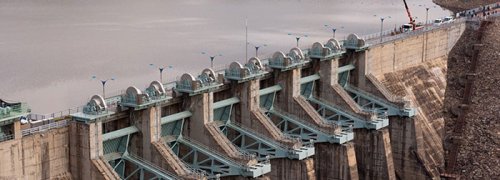Water-wise world – five ways ING helps manage the challenges of water
30 August 2016
Water is a vital component for life and industry. The irony of water is that both too little of it and too much of it each pose different challenges. World Water Week, held in Stockholm on 28 August—2 September 2016, is the annual focal point for the world’s water issues. ING will be there.

ING has financed various projects and clients related to water, from large infrastructural water projects to small water solutions for people in developing countries.
What can we as a bank do to help rise to the water challenges? ING has done research into water, and as ING Senior Economist Gerben Hieminga said in our water report (PDF 0.5 MB): “When it comes to our most precious resource, we are all in it together - a rising tide lifts all boats.”
50% of world population live in 7 countries that are prone to both water stress and flooding
Here are five things ING’s doing when it comes to water.
1) We are reducing our own water footprint.
We minimise our direct impact on the environment (PDF 0.4 MB) as much as possible, including water consumption. Total water consumption is reported as the total water consumed in cubic meters by our business for any use, including water usage for sanitary installations, air conditioning, cooling systems, cafeteria, garages, sporting areas, indoor plants, external areas, etc.
We’ve been improving how we measure water usage within ING, with now 93 percent of employees covered in the data that’s reported internally. Our target is to reduce our water footprint by 20 percent by 2020. ING Belgium is a good example, where we collect rainwater for sanitation, thereby significantly improving water efficiency and using less drinking water for non-consumption purposes.
2) We finance a range of water projects and transactions.
ING has financed various projects and clients related to water, from large infrastructural water projects by our structured finance team, to small water solutions for people in developing countries. One example is the expansion of the ASPLC wastewater management plant in Ajman, part of the United Arab Emirates, which allows an additional 40 million liters of wastewater to be treated per day. Another is the Grensmaas project, which prevents flooding in the Dutch province of Limburg by deepening the Maas (or Meuse) river and enlarging the riverbed.
3) We’re exploring more ways we can help solve water challenges.
Knowledge and business go hand in hand. ING’s Economics Department has researched the impact of water challenges on different sectors and released its findings in the report ‘Too little too much’ (PDF 0.5 MB) and an interactive world map (PDF 21 MB)) with water data for the world’s 60 largest economies. A follow-up report that puts the circular economy at centre stage in the water sector is already in the making (expected publication early 2017), as we continue to contribute to water-related challenges.
4) We partner with expert organisations to share our knowledge on water.
ING is partnering with the International Water Association (IWA) and other water experts to advise on solutions for water-resilient cities. We’re also a member of the Netherlands Water Partnership (NWP), which brings together water expects from areas such as finance, technology and supply.
5) We included “blue” in our green bond.
ING successfully issued a five-year EUR 500 million and three-year USD 800 million green bond last year November. The money raised has been allocated to projects in six categories, including water. This is a broad approach, which reflects our ambition to support sustainability across all industries and sectors.

